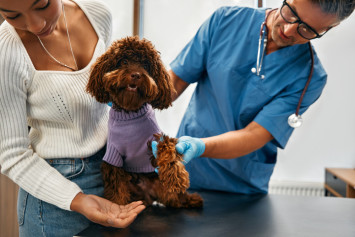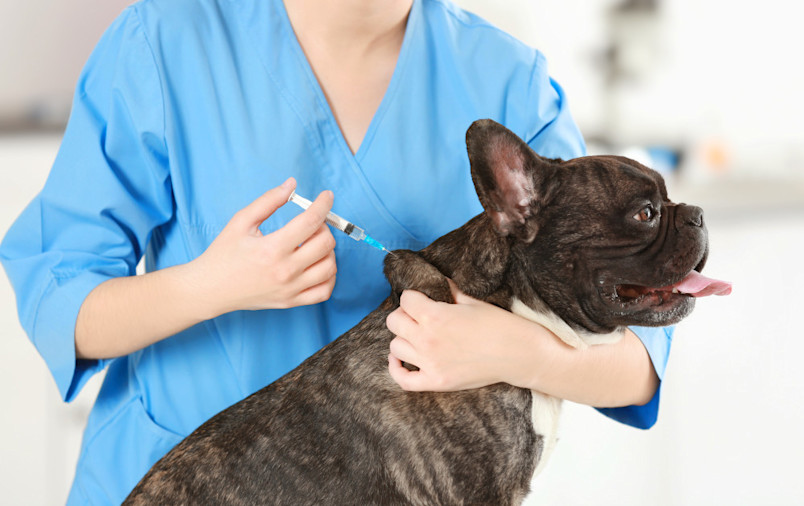
Stepping into the vet's office with your furry friend can be a whirlwind of emotions – excitement, apprehension, and a dash of anxiety. Amidst the flurry of checkups and examinations, the topic of vaccines often takes center stage. While the array of options might seem daunting, one particular vaccine stands out as essential for your canine companion's well-being: the DAPP vaccine for dogs.
What is the DAPP Vaccine for Dogs?
In the realm of canine healthcare, vaccinations play a pivotal role in safeguarding our furry companions against a multitude of potentially debilitating diseases. Among the array of available vaccines, DAPP (Distemper, Adenovirus-2, Parvovirus, and Parainfluenza) stands out as an essential cornerstone of preventive care. This comprehensive vaccine shields our canine companions from a quartet of formidable foes, each capable of wreaking havoc on their health and well-being.
Administered as a series of injections commencing at six weeks of age, the DAPP vaccine for dogs imparts long-lasting protection against these formidable foes. This investment in our dogs' future ensures they can romp and play without the fear of contracting these debilitating diseases, enjoying a life filled with vitality and unfettered joy.
Embracing the DAPP vaccine for dogs is an act of unwavering love and responsibility towards our canine companions. By empowering them with immunity against these potentially life-threatening diseases, we safeguard their health and well-being, ensuring they can thrive for years to come.
Canine Distemper Virus
As mentioned above this is a single vaccine that will generate antibodies to four different viruses. The first is Canine Distemper Virus. Canine distemper is a highly contagious and potentially fatal virus. Younger puppies are the most susceptible, but any age dog can contract it. Symptoms of canine distemper include fever, nasal and eye discharge, coughing, lethargy, reduced appetite, vomiting, and neurological signs such as seizures. There is no cure for Canine Distemper, and it is usually managed with supportive care but, luckily, it is fairly rare in the United States. This is only because we vaccinate so vigilantly against it. Vaccination is the most effective method of preventing the spread and impact of this serious viral infection.
Canine Adenovirus
Canine Adenovirus (Type 1) is the culprit behind Canine Infectious Hepatitis (CAV), a viral infection that targets the liver of dogs. The name "hepatitis" aptly translates to inflammation of the liver, and in this case, it's specifically caused by an Adenovirus. Symptoms can include mild signs like decreased appetite, lethargy and even a mild fever. Rarely, affected dogs develop opacity (cloudiness) of one or both corneas of their eyes (so-called blue eye) shortly after infection. Dogs may also have respiratory signs, such as eye and nasal discharge and a cough. Severe cases occur most often in puppies and additional symptoms include abdominal pain, vomiting, diarrhea, edema (fluid swelling under the skin) of the head and neck, and possibly icterus (jaundice). These cases can be fatal. Similar to most other viruses, there is no cure to this disease and treatment is most often supportive care to manage symptoms. Vaccination is also the most effective method of prevention.
Canine Parvovirus
Canine Parvovirus, often shortened to “parvo” is an extremely contagious and frequently deadly virus that can affect all dogs, though unvaccinated dogs and puppies younger than four months old are the most at risk. Parvovirus is ubiquitous in the environment and VERY difficult to kill. The virus attacks rapidly dividing cells in the body such as in the gastrointestinal tract, bone marrow (and thus the immune system) and, rarely, the heart. Symptoms usually include lethargy, depression, and loss or lack of appetite, followed by a sudden onset of high fever, vomiting, and severe diarrhea. Treatment usually involves hospitalization but is essentially supportive until the dog's immune system can, hopefully, fight off the viral infection. Since Parvovirus is such a severe disease, a new antiviral treatment for Parvovirus called CPMA has recently been developed that may shorten the time a patient needs to spend in the hospital, it is still fairly new, but many practitioners are hopeful this will be very effective. Vaccination is also very effective at preventing this disease.
Parainfluenza Virus
Parainfluenza virus is a highly contagious respiratory pathogen and one of the main causes of Infectious Tracheal Bronchitis (also referred to as “kennel cough”). Kennel cough, also known as canine infectious tracheobronchitis, is not a single disease but rather a complex of infections caused by various viruses and bacteria. These infectious agents work together to irritate the airways of dogs, leading to a range of respiratory symptoms. Symptoms of this infection include coughing, low-grade fever, nasal discharge, lack of energy or loss of appetite. Severe cases can lead to pneumonia and, especially in puppies, this can be very dangerous. As above, there is no cure and only vaccination can prevent its spread.

When Should My Dog Be Vaccinated?
The DAPP vaccine for dogs, an essential part of a puppy's vaccination series, shields your furry friend from four formidable foes: distemper, adenovirus-2 (canine infectious hepatitis), parvovirus, and parainfluenza. But when should this crucial vaccine be administered?
Puppies typically receive their first DAPP vaccine between 6 and 8 weeks of age. This initial dose marks the beginning of a series of injections, each spaced 2 to 4 weeks apart. The goal is to provide your puppy with ongoing protection as their immune system matures.
The frequency of these booster shots is crucial for developing long-lasting immunity. By the time your puppy reaches 16 weeks of age, they should have completed the full series of DAPP vaccinations. However, in high-risk areas, such as shelters or kennels, an additional booster shot around 18 to 20 weeks of age may be recommended to ensure maximum protection.
After completing the puppyhood vaccination series, your dog's immunity against these diseases will need a periodic boost. One year after their final puppy vaccine, they will receive another DAPP booster, typically labeled for 3 years. As long as your dog stays up-to-date on their DAPP boosters, they'll only need one every 3 years, ensuring their protection throughout adulthood.
What Should I Expect After My Pet’s Vaccine?
Although vaccines may occasionally cause side effects, these are typically mild and transient. This can include mild lethargy or soreness at the injection site. Some pets will develop a small lump at the injection site. Often these are not painful and will resolve on their own in a few weeks. Rarely, a more painful inflammatory lesion will develop at the injection site, but this is usually treatable with a short course of medication. True anaphylactic allergic reactions to vaccines are quite rare. If they do occur it is usually within an hour or two of the vaccine and is obvious. Symptoms include swollen face, swollen paws, hives or intense vomiting or diarrhea. If you notice any of these side effects, it's crucial to seek veterinary attention promptly. With timely intervention, pets typically make a full recovery.
How Much Does a DAPP Vaccine Cost?
The DAPP vaccine for dogs can cost anywhere from $15 to $100, but it's worth every penny. The price can vary depending on where you live, the brand of vaccine your vet uses, and if the vaccine has any additional components. No matter how much it costs, it's still far less expensive than treating one of those diseases, and the frequency of vaccinations decreases once a dog reaches adulthood.
Are There Other Vaccines My Dog Should Receive?
There are several other canine vaccines available, and they are usually divided into core and non-core vaccines. DAPP, Rabies, and Bordetella (one of the other components of kennel cough) are usually considered core vaccines. Non-core vaccines include the vaccine for Lyme disease which is recommend if you live in an endemic area for Lyme Disease, Leptospirosis, and Canine Influenza. Leptospirosis is carried in rodent urine and can cause severe liver and kidney disease. Luckily there is a DAPP-L vaccine that combines both serums and is very convenient. Canine Influenza is also an important inoculation as it is very common in dogs that go to boarding, dog parks, day care or grooming. It is a severe respiratory disease that tends to progress to pneumonia more often than many of the other kennel cough culprits.
As a veterinarian, I cannot emphasize enough the importance of keeping dogs up to date on their vaccines. Many of these diseases would become rampant if we stopped vaccinating for them regularly. I have seen all of them in person, and they can be truly devastating. Your veterinarian will work with you evaluate your pet’s lifestyle to create a personalize vaccination plan.

Ensuring a Lifetime of Love and Care: The Role of Pet Insurance
Our pets are more than just furry companions; they are family members who enrich our lives with their unconditional love and unwavering loyalty. As responsible pet owners, we want to ensure their well-being and happiness, and that includes protecting them from unforeseen medical emergencies. This is where pet insurance comes into play, acting as a safety net that alleviates financial worries and allows us to focus on what matters most – providing the best possible care for our beloved furry friends.
While pet insurance doesn't cover routine care like vaccinations, optional wellness plans can help you budget for preventive care expenses. These plans typically include reimbursements for vaccinations, annual checkups, spaying or neutering, dental cleanings, and more—ensuring your pet receives the necessary care to maintain their health and vitality.
Safeguarding Your Canine Companion with the DAPP Vaccine for Dogs
As you embark on the wonderful journey of pet parenthood, remember that your canine companion deserves the best possible care. The DAPP vaccine for dogs, an essential part of their preventive healthcare, plays a crucial role in safeguarding their health and well-being for years to come.
Investing in your dog's health is not just about protecting their physical well-being; it's also about nurturing the unique bond you share. By prioritizing their health, you're ensuring that your furry friend remains an integral part of your life, creating countless cherished memories together.
Embrace the DAPP vaccine as an act of love and responsibility. It's a simple yet significant decision that will resonate throughout your dog's life, allowing them to thrive with vitality, joy, and endless companionship.